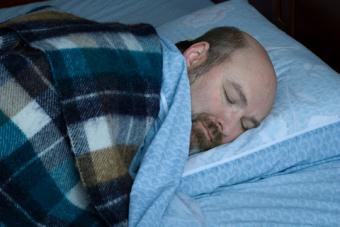
Finding a night terror cure may take more time than medications or alternative therapies. This is because the condition is often overcome after a matter of time. For children, the most common time to suffer from night terrors is between the ages of three and five, then again during adolescence. Adults can also suffer from night terrors. Overcoming the episodes may be possible with lifestyle changes.
In Search of a Night Terror Cure
There is no medical cure for night terrors. Those who are suffering from the condition should speak with their doctor. The doctor will ask questions about symptoms experienced by the individual. They may ask about changes in daily life, especially for adults. In most cases, this gives the doctor enough information to make a diagnosis. In other situations, where the doctor believes the individual may also be suffering from other sleep disorders, such as insomnia, there may be a request for a sleep study.
With this information doctors can determine if the individual is suffering from night terrors. If so, they may offer some advice on what to do about it, if anything. There are several recommendations doctors may make.
Provide Comfort
Especially important in children experiencing night terrors is for the parent to provide comfort and reassurance to the child even if they are still asleep. The child often needs to feel protected and safe if they suddenly wake up:
- Soothe them in a calming voice.
- Avoid trying to jar them awake. Most episodes will last no more than ten to twenty minutes.
- Hold them, allow them to fall back to sleep after assuring them there is nothing to fear.
- Don't insist on knowing what they were dreaming about. They may not remember.
- Do listen to their concerns and fears.
In most cases, children will outgrow the night terrors within a few years. Most will not remember the event after they wake up. In most situations, the parent is more concerned than the child is.
Psychotherapy or Counseling
In some situations, the right type of night terror help is in the form of psychotherapy. Counseling sessions with a psychiatrist may be helpful at exploring the reason behind the night terror. This is not often needed with children, unless the condition has lead to insomnia or has caused changes in daily life, such as a lack of quality sleep resulting in poor grades in school. In adults with prolonged episodes, treatment can be helpful.
Counseling may be one of the best cures for night terrors as it allows the individual to explore the cause of the terrors. It can also help with relieving stress, anxiety, and depression, all of which can be causes of adult night terrors. In most adults, the condition will reverse itself, after a time period or lifestyle changes. Yet, for those unsure of the cause, getting counseling can be highly helpful.
Medication Treatments
In some situations, doctors may prescribe medications to treat the night terrors. This rarely occurs since other treatments are highly effective and safer, or no treatment is necessary.
Some medications can help to reduce the number of night terrors or the length of them. For example, Benzodiazepine medications including diazepam can be taken prior to going to bed and can provide for a reduction in night terrors.
Lifestyle Changes Improve Night Terrors
The most significant night terror cure is to improve lifestyle. By making a few changes, good results are visible in most individuals who suffer from night terrors:

- Determine about what time during the night a child is suffering from night terrors. Most will experience them during the first third of the night. Wake the child about 15 minutes prior to this time. Then, allow them to go back to sleep a few minutes later. This can stop once the terrors become infrequent.
- Get help for emotional problems. Those who who get help for stress, anxiety or other emotional trauma may experience a drop in the number of episodes they experience.
- Adjust sleep times to ensure the child is able to get more sleep even with the episodes.
For problems that continue or are persistent, seek a doctor's advice on how to treat the condition. Most situations require time to overcome.







